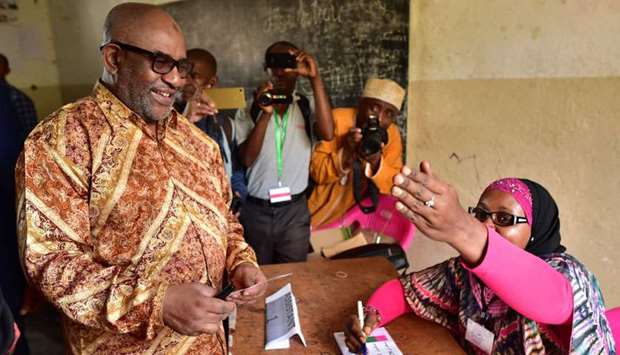Comoros President Azali Assoumani appeared to be ahead as counting continued of votes cast in a referendum on proposals to radically extend his powers, the government said on Tuesday.
The Indian Ocean archipelago has a long history of instability and risks renewed unrest after Assoumani banned demonstrations and the opposition called for a boycott of Monday's vote.
Interior Minister Mohamed Daoudou said the president's "yes" camp was leading according to the first results. If approved, the vote would allow Assoumani to rule beyond his 2021 term limit.
At one polling station in Matsamoudou on Anjouan island, an official tallied results showing "yes" clearly ahead with chalk on a dirty blackboard.
"The initial trend in the results shows that 'yes' is comfortably ahead," said Daoudou, quoted in the state-run Al-Watan newspaper, after 70 percent of polling stations had reported.
Turnout was 63 percent, added the minister, who said that the vote "ran smoothly".
The opposition, which labelled the referendum "illegal", accused the government of faking the results.
"What a result! A faked vote, fabricated figures -- that's how President Azali consults the public," said secretary general of the opposition Juwa party, Ahmed el-Barwane.
'Sudden flood of voting papers'
Under the constitution adopted in 2001, power rotates every five years between Comoros' three main islands as a means of balancing politics in the coup-prone country.
If the government wins the referendum, this arrangement would be scrapped and replaced by a president who would be elected for a five-year tenure, renewable for one term.
Assoumani would also gain the power to scrap the country's three vice-presidencies, another balancing measure of the present constitution.
If the referendum is approved, Islam would also be proclaimed the state religion for the first time. Ninety-nine percent of the Comorans are Sunni Muslim.
One businessman who requested anonymity told AFP he had not voted because he "sensed a scam".
In the capital Moroni there were only a handful of posters of Assoumani's face emblazoned with slogans exhorting voters to support his reforms.
The opposition did not participate in the process and turnout appeared weak at several polling stations in the capital, AFP reporters witnessed.
"In the majority of polling stations visited there were fewer than 20 voters waiting to cast their ballots. But when we returned we observed a sudden flood of voting papers in the ballot box," Jules Hoareau, part of the Eastern Africa Standby Force observer mission, told AFP. "That doesn't make any sense."
The poll was marred by several incidents including the destruction of ballot boxes at a polling station in Moroni in which a policeman was stabbed and hospitalised.
'There was no apocalypse'
But state media insisted "there was no apocalypse... the vote proceeded without any major incident".
In the run-up to the poll, one of the vice presidents, Moustoidrane Abdou escaped an assassination attempt when his car was attacked by gunmen on motorcycles.
If Assoumani wins the referendum, he is expected to stage early elections next year to extend his time in office.
But he has vowed to stand down if he loses Monday's vote, according to his spokesman Mohamed Ismailla.
The Comoros -- a group of three islands between Mozambique and Madagascar and one of the world's poorest countries -- has endured repeated coups and political turmoil since independence from France in 1975.
Assoumani, a 59-year-old former colonel, was president between 1999 and 2002, coming to power after ousting acting president Tadjidine Ben Said Massonde in a military coup.
He won the country's first multi-party elections in 2002, stepping down in 2006 to hand over power democratically to Ahmed Abdallah Sambi.
In May 2016, he returned again as president after an election marred by violence and allegations of voting irregularities.
In April this year, Assoumani suspended the Constitutional Court saying it was incompetent.

